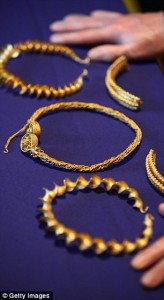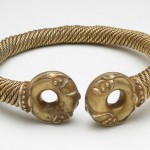 The UK metal detector squad strikes again, this time near Stirling, Scotland, with a hoard of 4 exquisitely crafted gold torcs. They date from the 1st to the 3rd century BC, long before the Roman invasion, and are probably of Celtic origin.
The UK metal detector squad strikes again, this time near Stirling, Scotland, with a hoard of 4 exquisitely crafted gold torcs. They date from the 1st to the 3rd century BC, long before the Roman invasion, and are probably of Celtic origin.
One of the necklaces is a ribbon torc, and appears to have been made from twisted Irish or Scottish sheet gold. Another is encrusted with small circles of gold wire and beads of gold that look like pearls, with two fine gold chains acting as fasteners.
A source close to a team that excavated the site in the wake of the find said: “We’ve never seen anything like this before. The workmanship is breathtaking. Some of the gold wire used is the thickness of your finger. No-one here wants to put a price on it. One of the guys said that there were a lot of silly figures flying around.”
 The Newark torc, found by a metal detectorist in Newark, Nottinghamshire, was valued at £350,000 ($575,000) in 2005. It’s made of gold and silver while the Stirling torcs are all gold, 3 of the 4 in perfect condition, so the silly figures flying around could easily surpass the £1,000,000 mark.
The Newark torc, found by a metal detectorist in Newark, Nottinghamshire, was valued at £350,000 ($575,000) in 2005. It’s made of gold and silver while the Stirling torcs are all gold, 3 of the 4 in perfect condition, so the silly figures flying around could easily surpass the £1,000,000 mark.
Its historical value is inestimable. Before now, historians didn’t realize there was gold work of this quality and expense in Iron Age Scotland. There has only been one torc of equivalent craftsmanship and materials found and that was in Southern France. It indicates trade with the continent and a very wealthy wearer.
The torcs are at the Treasure Trove Unit in Edinburgh right now. The Scottish Archaeological Finds Allocation Panel will decide their value and reward the finder and property holder its market value.
Fresh new metal detector, first week out for fun, $2m find… Some people just have all the luck.
————————————–…
The End is Coming
History will be Back…
http://endiscomingblog.com
Also on History News Network (hnn.us)
I know, really! He hadn’t even used it once outside of his kitchen. Crazy beginner’s luck.
All this really makes me want to take up metal detecting as a hobby.
Those are really gorgeous…the workmanship is top notch.
PS: I love how Brits use the word “Silly”
The end
I bet all you’d find are old hooks-and-eyes and Coke cans. The glorious gold torcs are for people who live in cooler countries than ours, I’m afraid.
Well, maybe I could find pirate treasure or something :skull: Or yeah, beer cans
You should plant some pirate treasure in your yard now and then find it on the pirate ship’s maiden voyage.
Great beginners luck but its all downhill from day one……..
True. It must be tough to adjust to scrap metal and old pennies after a find like that.